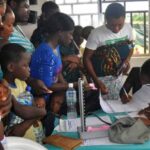
The Federal Capital Territory Administration (FCTA) has identified the dearth of human resources for health as the major challenge facing over 300 Primary Healthcare Centres (PHCs) in the nation’s capital city.
Mandate Secretary, Health Services and Environment Secretariat of the Federal Capital Territory, Dr Adedolapo Fasawe, who stated this at the close out of the United States Agency for International Development (USAID) Integrated Health Programme (IHP) in Abuja, lamented the inadequate health workers in PHCs, adding that the present administration with the support of the USAID is transferring skills and training community health workers to man PHCs.
She said: “There is a dearth of human resources in health, globally. It is not surprising that some of the PHCs are not manned. You have people traveling abroad, and people leaving their jobs. So, we are transferring skills and training community health workers to manage those PHCs. With this kind of project and programmes, we will train community people to give out the basics.”
Fasawe said that FCTA is strengthening its drug-revolving system to ensure that “at no point in time would you go to a PHC and they will tell you there are no drugs in stock. As we speak, we have drugs in all the PHCs that people access.”
The Mandate Secretary pointed out that the USAID IHP programme over the past four years has helped the FCT Administration to strengthen the health system to ensure seamless referrals for health seekers.
Fasawe said that the FCTA is working to improve and make the health indices in FCT one of the best in the country. “What we have come to realise is that government cannot do the work called healthcare alone. We need partners, supporters, and regular civilians, as healthcare is a collective responsibility.
“We have about 60 sets of close user groups’ telephones that were donated to us through this project. Now, our two-way referral system is smooth. Before, a patient is taken from one spot to the other; somebody is expecting her or him at the other end. Now, electronically and you can be referred.”
Fasawe said the administration has zero tolerance for maternal mortality. “No woman should die of childbirth complications. IHP and this project have helped us to look at low-hanging fruits, and how we can reduce maternal mortality, through education, advocacy, and sensitisation.
FCT has made health insurance free for pregnant women. We want people to go to our nearest health facility, and register for health insurance, which will ensure that the baby’s first year of life will be taken care of, free of charge.”
Also speaking, the Acting Executive Secretary, FCT Primary Healthcare Board, Dr Yakubu Mohammed, said the objective of the project was to strengthen health systems, improve access to primary healthcare services and increase the quality of PHC.
He noted that the project, which has changed FCT health services was designed to implement priority PHC interventions, strengthen the health leadership at the ward-level health systems, as well as engage with the government.
Mohammed explained that the project also supported the private health sector system for better health outcomes.
The USAID Integrated Health Program (IHP) is a five-year USAID’s expanded technical support to Nigeria to rapidly scale up proven reproductive, maternal, newborn, and child health, nutrition and malaria interventions.
The project targets improved access and increased quality of primary health care service delivery. It was implemented in Ebonyi, Bauchi, Kebbi, Sokoto states, and FCT, as well as supports health policies and systems at the federal level.













